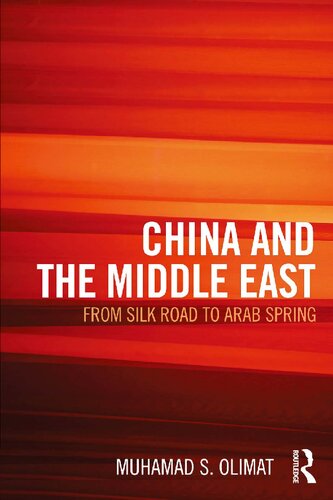

Most ebook files are in PDF format, so you can easily read them using various software such as Foxit Reader or directly on the Google Chrome browser.
Some ebook files are released by publishers in other formats such as .awz, .mobi, .epub, .fb2, etc. You may need to install specific software to read these formats on mobile/PC, such as Calibre.
Please read the tutorial at this link: https://ebookbell.com/faq
We offer FREE conversion to the popular formats you request; however, this may take some time. Therefore, right after payment, please email us, and we will try to provide the service as quickly as possible.
For some exceptional file formats or broken links (if any), please refrain from opening any disputes. Instead, email us first, and we will try to assist within a maximum of 6 hours.
EbookBell Team

0.0
0 reviewsThis manuscript examines relations between China and the Middle East in historical context. It highlights some of the most important events that characterize the ties between China and the Middle East, and examines their relationship in key areas that include energy, trade, arms sales, culture and politics.
The centre of China’s relations with Israel is arms sales and advanced technology, while the core of Sino-Saudi relations is oil. Iran and China are tied with deep historical, civilizational, cultural and political relations, but China’s current interests in Iran centre on oil. Relations between China and the United Arab Emirates (UAE) centre on trade. The UAE serve as a primary hub for Chinese business corporations not only in the Gulf or the wider Middle East, but also in Africa and the world. China’s relations with Algeria have been based on political co-ordination since the early days of the Algerian War of Independence and the early days of the People’s Republic of China. China provided Algeria with political, diplomatic and military support to accomplish its national liberation from France. Since then, their partnership has developed.
Finally, the book develops a tridimensional approach in which China’s ties with Middle Eastern countries are viewed as an outcome of interaction between three actors in each situation. The book reaches the conclusion that China’s national interests in the Middle East are only increasing, and it is anticipated that Sino-Middle Eastern relations and strategic partnerships will be enhanced in the near future, provided that China is not perceived as undermining the Arab Spring.
Key Features:
Explains why most Middle Easterners prefer China’s engagement to Western engagement
Explores the future of Sino-Middle Eastern relations